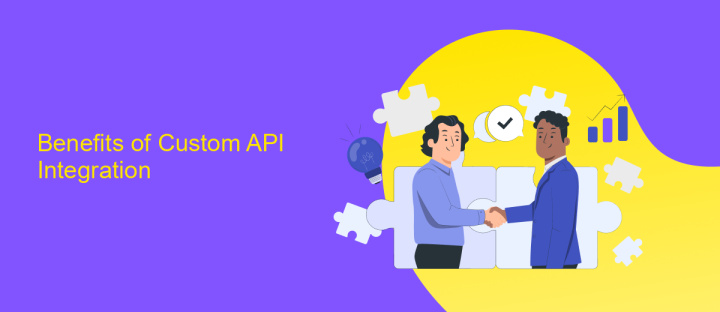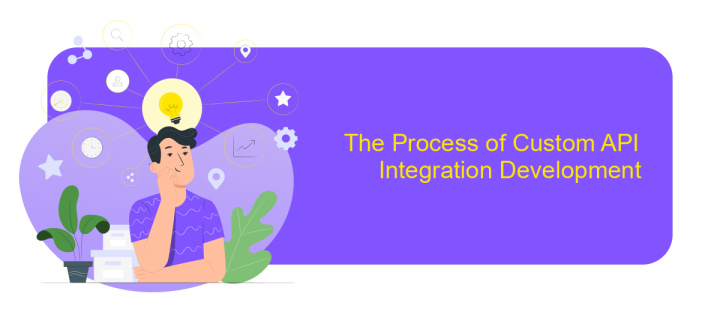Custom API Integration Services
In today's fast-paced digital landscape, businesses require seamless communication between various software applications to stay competitive. Custom API Integration Services offer tailored solutions to connect disparate systems, enabling efficient data exchange and streamlined operations. By leveraging these services, companies can enhance functionality, improve user experiences, and drive innovation. Discover how custom API integration can transform your business processes and unlock new opportunities for growth and success.
Understanding Custom API Integration Services
Custom API integration services are essential for businesses looking to enhance their digital capabilities by connecting disparate systems and applications. These services involve creating tailor-made solutions that allow different software platforms to communicate seamlessly, enabling efficient data exchange and streamlined operations. By leveraging custom API integrations, organizations can automate workflows, improve data accuracy, and enhance customer experiences.
- Seamless Data Exchange: Custom APIs facilitate the smooth transfer of data between systems, ensuring that information is consistent and up-to-date across platforms.
- Enhanced Automation: By integrating APIs, businesses can automate routine tasks, reducing manual intervention and increasing operational efficiency.
- Scalability: Custom API solutions can be designed to accommodate future growth, allowing businesses to expand their digital ecosystems without significant overhauls.
- Improved User Experience: With APIs, companies can offer more cohesive and personalized experiences to their users by integrating various services and features.
Understanding the intricacies of custom API integration is crucial for businesses aiming to stay competitive in today’s digital landscape. It requires a strategic approach to design, implementation, and management to ensure that the integration aligns with business objectives and delivers the desired outcomes. Partnering with experienced API developers can help organizations navigate this complex process effectively.
Benefits of Custom API Integration

Custom API integration offers businesses the flexibility to connect disparate systems, enabling seamless data exchange and improved operational efficiency. By tailoring API connections to specific needs, companies can automate workflows, reduce manual data entry, and minimize errors. This leads to enhanced productivity and allows teams to focus on strategic tasks rather than repetitive ones. Moreover, custom integrations can scale with business growth, ensuring that evolving requirements are met without the need for extensive reconfigurations.
Utilizing services like ApiX-Drive simplifies the process of custom API integration, providing user-friendly tools that streamline the connection of various applications. Such platforms offer pre-built connectors and intuitive interfaces, reducing the technical burden on IT departments. With ApiX-Drive, businesses can quickly adapt to changing market demands by easily integrating new software solutions, thus maintaining a competitive edge. Overall, the benefits of custom API integration lie in its ability to foster innovation, enhance customer experiences, and drive business success through efficient and adaptable technological ecosystems.
Key Considerations for Custom API Integration

When embarking on custom API integration, it's crucial to consider several key factors to ensure a seamless and effective implementation. Understanding these elements can help mitigate potential challenges and maximize the benefits of your integration efforts.
- Compatibility: Ensure that the API is compatible with your existing systems and platforms. This involves checking data formats, protocols, and any potential conflicts with current software.
- Security: Evaluate the security measures of the API, such as authentication, encryption, and data protection policies, to safeguard sensitive information.
- Scalability: Consider whether the API can handle increased loads and future growth, ensuring it can scale with your business needs.
- Documentation: Comprehensive documentation is essential for understanding API functionalities and troubleshooting issues, so prioritize APIs with detailed guides and support resources.
- Cost: Analyze the cost implications, including any licensing fees, maintenance expenses, and potential hidden costs associated with the API.
Addressing these considerations can significantly enhance the success of your custom API integration project. By thoroughly evaluating these factors, you can ensure a more efficient integration process, ultimately leading to better performance and user satisfaction.
The Process of Custom API Integration Development

Custom API integration development is a meticulous process that involves several key stages to ensure seamless connectivity and functionality. The journey begins with a thorough analysis of the client's requirements and the existing system architecture. This step is crucial as it lays the foundation for designing an API solution that aligns with the business objectives.
Once the requirements are clear, the next phase is the design and development of the API. This involves selecting the right technology stack, defining data structures, and establishing protocols for data exchange. The goal is to create a robust and scalable API that can handle the anticipated load and provide reliable performance.
- Requirements Analysis: Understanding client needs and system specifications.
- Design & Development: Crafting a scalable and efficient API architecture.
- Testing: Conducting rigorous tests to ensure functionality and security.
- Deployment & Maintenance: Implementing the API and providing ongoing support.
Finally, thorough testing is conducted to ensure the API functions as intended and meets security standards. After successful testing, the API is deployed, and ongoing maintenance is provided to address any issues and accommodate future enhancements. This comprehensive process ensures a reliable and efficient API integration tailored to the client's needs.


Choosing the Right Custom API Integration Partner
Choosing the right custom API integration partner is crucial for the seamless and efficient operation of your business processes. Start by evaluating their experience and expertise in handling diverse API integrations. A reliable partner should have a proven track record in delivering tailored solutions that meet specific business needs. Consider their understanding of your industry, as domain knowledge can significantly impact the success of the integration. Additionally, assess their technical capabilities, including their ability to work with various programming languages and platforms.
Communication and support are equally important when selecting an API integration partner. Ensure they offer clear communication channels and are responsive to your queries and concerns. A partner like ApiX-Drive, known for its user-friendly interface and robust support, can simplify the integration process, allowing you to focus on your core business activities. Finally, evaluate their pricing model to ensure it aligns with your budget while offering value for money. By carefully considering these factors, you can select a partner that enhances your business operations through effective API integration.
FAQ
What is Custom API Integration?
Why is Custom API Integration important for businesses?
How can businesses benefit from automation through API integration?
What are the typical challenges faced during API integration?
How can one ensure a successful API integration?
Apix-Drive is a simple and efficient system connector that will help you automate routine tasks and optimize business processes. You can save time and money, direct these resources to more important purposes. Test ApiX-Drive and make sure that this tool will relieve your employees and after 5 minutes of settings your business will start working faster.

